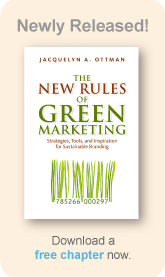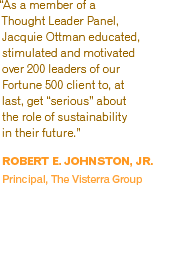Don’t Greenwash Your Marketing:
By Jacquelyn Ottman
Advertising Age, March 04, 2008
How the Green Landscape Will Shift in the Coming Year -- and Affect Your Industry
I expect we'll see some tectonic shifts this year in the world of green marketing. Well-intentioned marketers should heed these shifts if they want to stay off "greenwashing lists" and legal-department memos. Some marketers are influenced by the Federal Trade Commission's recent hearings on green-marketing claims and eco-labels, others on the outcome of large retailers' efforts to persuade suppliers to come up with trimmed-down products and packages. Here, then, my top four predictions:
-
Discredited Green Claims Lose Traction
Expect some now-meaningless marketing terms to fall by the wayside. For instance, expect to see fewer claims of biodegradability, especially with regard to some types of corn-based plastics, which have been found not to degrade in backyard compost heaps or even municipal systems.
There will be a virtual shutdown on claims of carbon offsetting until standards can be set and the for-profits and non-gevernmental organizations that sell the offsets can be verified. This year will also see the seeds planted to severely curb the use of self-imposed eco-labels such as Home Depot's
"Eco-Options" and Canon's "Clean Earth." Please folks, let's stick with only those labels, such as Energy Star, FSC and organic, that have been issued by trusted third parties.
Finally, I hope and pray that standards will finally be set for terms such as "natural," so that consumer confidence can be restored in this most basic of green attributes.
-
Electronics Suppliers Tout Eco-Performance
Expect electronics companies to start marketing their green bona fides, earned by creating programs to take back their products at end of useful life, and by reducing the use of toxic chemicals in response to two directives from the European Commission, the Waste for Electric and Electronic Equipment and the Restriction of Hazardous Substances. We've already been approached for help in crafting green strategies by no less than three of the big electronics firms (perhaps Wal-Mart has something to do with it?).
-
Companies Make More Green Products ...
Many more green products will hit the shelves in 2008 as the industry takes additional, more confident steps to satisfy retailer demands for products with less packaging, less energy use and reduced toxicity -- no PVC or heavy metals, for example. Many of these products will put primary benefits -- higher performance levels, aesthetics and cost effectiveness -- front and center in marketing materials, while green claims will recede, reflecting reticence from potential greenwashing backlash, and a simple growing awareness in good green marketing practice.
-
... and Companies Sell More Green Products
Green products sales will soar, boosted by the marketing heft of major consumer products firms that have been on a green-brand shopping spree of late. Examples include Clorox, which snapped up Burt's Bees in 2007 and launched its own GreenWorks brand; Colgate (Tom's of Maine); Procter & Gamble(Crest Naturals and Tide Coldwater); and Danone (Stonyfield Farm). Expect continued growth for deep green stand-alones, like Method and Seventh Generation, as they continue to grow behind mass-market distribution. A myriad of green product trade shows -- Coop America's "Green Festivals" in Chicago, Washington and San Francisco; the "Go Green Expo" in New York -- will introduce more consumers to greener alternatives.
Copyright © 1992-2008



 ShareThis
ShareThis
Jacquelyn Ottman is president, J. Ottman Consulting,
a green marketing consultancy that advises businesses on strategies for
developing and marketing environmentally sustainable products and
services. She is the author of three books on green marketing. Her
latest book,The New Rules of Green Marketing, is due out
in 2010.
Contact her by email
Follow
her onTwitter
Connect to
her onLinkedin
Read
her blog
Copyright© 2008 by J. Ottman Consulting, Inc.


